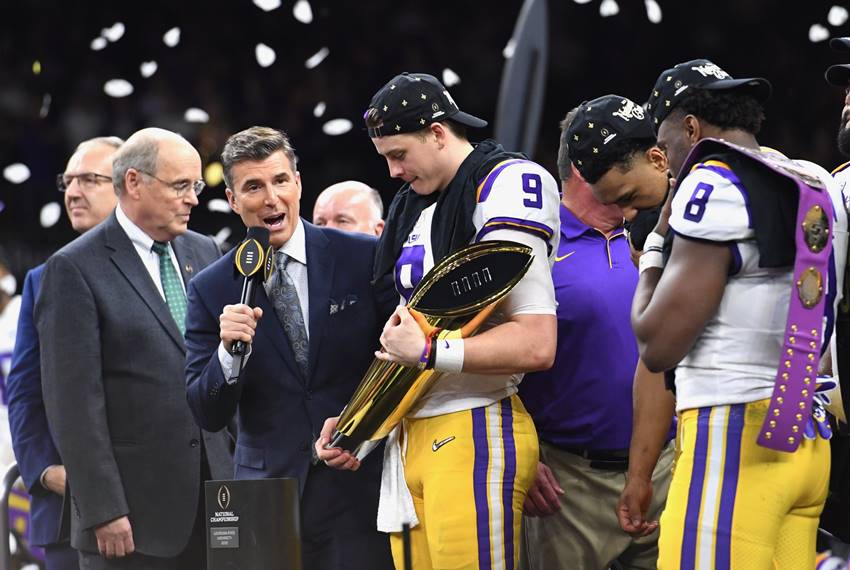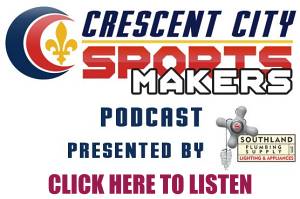My most memorable moments covering sports (Part 8 – LSU in Sugar Bowls and national championships)

The last really big sporting event around these parts prior to the COVID-19 pandemic shutdown was the College Football Playoff Championship Game between LSU and Clemson in the Mercedes-Benz Superdome.
It was the latest in a series of championship and otherwise memorable LSU football seasons that have concluded in the Superdome.
I take a look at several recent ones in Part 8 of my 10-part series on the most memorable sports moments I have covered.
5. LSU in non-championship Sugar Bowls
It’s always a special event when LSU plays in New Orleans, especially in the Sugar Bowl. The Tigers have played in the Sugar Bowls/Championship Games in New Orleans 16 times.
There was a 17-year drought between LSU’s 1968 Sugar Bowl victory against Wyoming and its 1985 Sugar Bowl loss to Nebraska. But the Tigers have played in the post-season in New Orleans eight times since ’85 and six times since 2002.
I’ve covered the last six, and even when there haven’t been national-championship implications the events have been memorable.
The Tigers beat Illinois (2001 season) and Notre Dame (2006 season) in the most recent appearances that didn’t impact the national title.
The game against the Fighting Illini was especially memorable. What stood out the most was Rohan Davey setting a slew of records by passing for 444 yards.
But my story for the Advocate had to do with the fans as LSU was making its first appearance in the Sugar Bowl in 15 years. Playing in a New Year’s Bowl, especially the Sugar Bowl, was a special event for Illinois, but very few Illini fans attended the game.
An hour or so before kickoff I could see from my seat in the press box that there was an enclave of Illinois fans dressed in orange sitting in the plaza level of the north end zone. So I went to interview them.
They were a jovial group and talked about what all the fun they were having in New Orleans. They even enjoyed the good-natured chants of “Tiger Bait!” that LSU fans had directed at them in the French Quarter.
I asked them if it would be OK if I came back during the second half to get their reaction to how the game was going. They said “sure.”
By the time I returned it was well into the second half, the Tigers had the game well in hand the mood in the Illini section had turned somber.
I asked how the LSU fans were treating them and whether they had heard any more “Tiger Bait!” chants.
“Yeah,” one of the Illini fans said, “we’re pretty sick of hearing that.”
4. The 2007 BCS championship
LSU was playing Ohio State for the national championship in the Superdome.
It was a small miracle that the Tigers were even there. LSU was a strong contender for one of the top two spots before it lost to Arkansas in triple overtime in Tiger Stadium Stadium in the regular-season finale on the day after Thanksgiving.
The Tigers would need a lot of help to get back into the title picture. LSU took care of business by beating Tennessee in the SEC championship and the obstacles that were out of the Tigers’ hands fell like dominoes, most notably as OklahomaState beat Missouri in the Big XII championship and Pittsburgh upset West Virginia.
Despite having two losses, LSU leaped to No. 2, partly because like the loss to Arkansas, the Tigers’ other loss (to Kentucky) had come in triple overtime. LSU coach Les Miles lobbied for the Tigers by pointing out that they were undefeated in regulation that season.
Ultimately the computers and the voters settled on LSU as the Buckeyes’ opponent.
Ohio State took an early 10-0 lead, but once Matt Flynn and the Tigers’ offense got untracked they were nearly unstoppable and rolled to a 38-24 victory.
3. The 2003 BCS championship
The victory against Ohio State came just four years after the Sugar Bowl’s most recent BCS Championship Game had also featured LSU. This time the Tigers faced Oklahoma.
I was around the news conferences and post-practice interviews all week, though my primary responsibility was to cover the Sooners.
One thing stood out to me in the days leading up to the game. LSU and coach Nick Saban were always right on time for interviews, handled the sessions efficiently and moved on. Oklahoma and Bob Stoops were far less punctual and businesslike.
I don’t know what if any impact that had on the game, but football teams tend to play the way they practice and otherwise go about their business. LSU played like a focused, efficient team and Oklahoma didn’t.
The Tigers prevailed 21-14 for their first national championship in 45 years.
2. The 2011 season
I’m going to focus more on the whole season rather than just the BCS Championship Game in the Superdome because I covered every LSU game that season in what was one of the most impressive regular seasons in college football history.
It started with a 40-27 victory over preseason No. 3 Oregon at Cowboys Stadium in Arlington, Texas. It included seven other wins against ranked teams and an overall average victory margin of 26 points.
Tyrann Mathieu’s dynamic play on defense and as a return specialist earned him a trip to New York as a Heisman Trophy finalist. The defense was one of the most talented and dominant in SEC history.
The offense didn’t match the standard of the defense as Jarrett Lee and Jordan Jefferson shared the quarterback position, though the Tigers still averaged 48 points per game.
The highlight of the regular season came when No. 1 LSU went into Tuscaloosa and beat No. 2 Alabama 9-6 in overtime in one of the most highly rated regular-season games in recent memory.
A late-season loss by No. 2 Oklahoma State to Iowa State paved the way for a Tigers-Crimson Tide rematch in the title game and Alabama dominated, 21-0.
For most of that season it seemed the 2011 LSU team would match the 2003 and 2007 versions by winning a national championship in the Superdome.
It didn’t turn out that way in the end, but the body of work by that team remains one of the best in school history.

1. The 2019 season
The 2019 Tigers were able to take that final step that the 2011 Tigers couldn’t.
There were a lot of similarities between the two regular seasons, though the 2011 team rode the defense and the 2019 team rode the offense.
Both teams were dominant. Both teams played extremely challenging schedules. Both teams ascended to No. 1 during the regular season and stayed there until the final game.
Joe Burrow had the most productive passing season in NCAA history and won the Heisman by a record margin as head coach Ed Orgeron’s team put together quite possibly the most impressive season in LSU history.
The Tigers finished it off with a 42-25 victory over defending national champion Clemson in the Superdome.
It was the fourth time in 17 seasons that I had covered LSU playing for a college football national championship fewer than 100 miles from Tiger Stadium.
That’s pretty memorable.
- < PREV Interview: New Orleans Jesters general manager Kenny Farrell on All Access
- NEXT > Matt Pinero of St. Paul’s captures Louisiana Wrestling Coach of the Year
Les East
CCS/SDS/Field Level Media
Les East is a nationally renowned freelance journalist. The New Orleans area native’s blog on SportsNOLA.com was named “Best Sports Blog” in 2016 by the Press Club of New Orleans. For 2013 he was named top sports columnist in the United States by the Society of Professional Journalists. He has since become a valued contributor for CCS. The Jesuit High…






